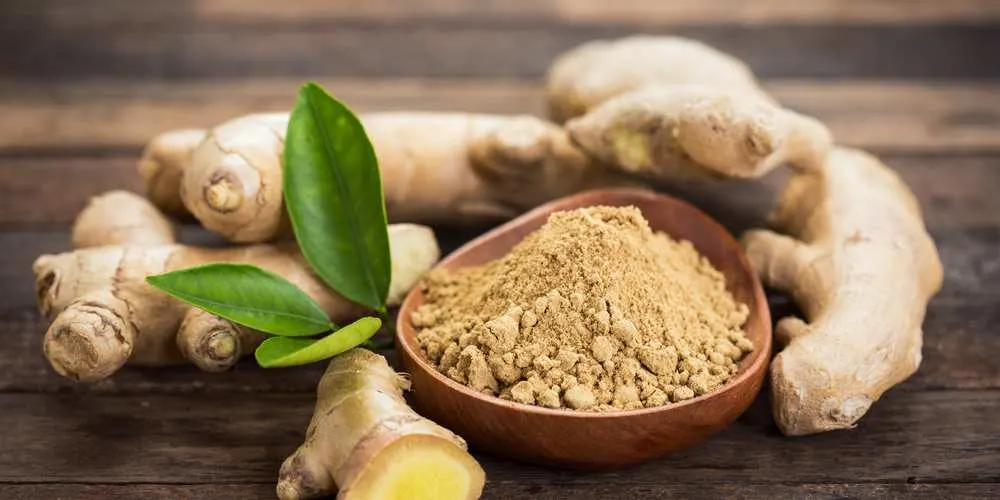Ginger is commonly used during Christmas time, both raw and processed, though ginger powder is the most popular form. And those who are aware of its health benefits consume it all over the year.
But the questions that may arise in dog owners’ heads are: Can dogs eat ginger? Is my dog going to benefit from eating ginger?
If you’re thinking of incorporating this root into your pet’s diet, here is all the research and science behind it. Stay tuned!

Can Dogs Eat Ginger?
In broad strokes, the answer is: yes, dogs can eat ginger. Ginger isn’t considered toxic to dogs, and it’s safe, even desirable, that you give it to your pet every now and then.
However, we need to delve into the matter much deeper so that you have a complete understanding of how much and when it should eat it.
First, just think about it: even for us, ginger has quite a unique flavor profile. It’s difficult to describe it, but it’s a mixture of spicy, warm, and sharp taste. We know only a handful of people who would chomp down on a chunk of ginger without making a silly face!
The same goes for dogs – they will be shocked the first time they try ginger, and might not even like it.
However, it’s still good to give ginger to them because it can benefit their health in a similar manner it affects ours.
How Much Ginger Should Your Dog Have?
It’s best to feed your dog ginger in the raw form, and not capsules, tea, and other varieties there are. The powder is also okay, though it has fewer health benefits.
The amount that you should give it depends on the size of your dog. However, it’s always best to start slow, with smaller quantities. As we mentioned, ginger is sort of an acquired taste, so you don’t want to upset your pup!
You can refer to the following chart for general guidelines on how much ginger to administer to your dog:
Daily Intake Of Ginger Based On Your Dog’s Weight
| Weight | Optimal Amount of Ginger |
|---|---|
| Below 10 pounds | Up to 1/4 tsp |
| 10-50 pounds | Up to 1/2 tsp |
| 20-50 pounds | Up to 1 tsp |
| 50-100 pounds | Up to 2 tsp |
| Over 100 pounds | Up to 1 tbsp |
This is the general rule. If your dog has some problems or is sensitive to certain foods, always consult your vet about dosing.

Benefits Of Ginger For Dogs
In order to tackle all the benefits of including ginger in your dog’s diet, let’s take a closer look at its nutrition facts.
These are the values for 1 tablespoon of ginger (the daily intake for large and heavy dog breeds).
| Calories | 4.8 |
| Carbohydrate | 1.07 grams |
| Dietary fiber | 0.12 grams |
| Protein | 0.11 grams |
| Fat | 0.5 grams |
| Sugar | 0.1 gram |
Does this chart tell us much? Not really.
From this, we can only conclude that ginger is low in sugar and fats, which is good. But it also doesn’t contain a lot of protein or calories.
Its real nutritional value lies in the vitamins and minerals it contains:
- Iron
- Potassium
- Magnesium
- Zinc
- Phosphorus
- Vitamins B3, B6, and C
- Folate
- Riboflavin
All of these are a valuable addition to anyone’s diet, and that’s why your dog can, and should, eat ginger from time to time.
These are the main benefits of feeding your four-legged friend ginger:
1. Helps Them With Nausea
Do you often reach to grab some ginger when you’re feeling a bit under the weather and like vomiting? If not, know that ginger will help you with nausea and an upset stomach.
The same applies to your dog.
Giving it the optimal dosage of fresh or powdered ginger can help.
A Pro Tip: Give ginger to your doggo if it is experiencing car sickness. 20 minutes before the ride should do.
2. Relieves Bloating
If you feel that your dog is bloated, or its stomach looks enlarged, ginger can play a role in alleviating the symptoms.
The reason is that it stimulates bowel movement and thus helps your dog get rid of built-up food and/or gas that it cannot expel.
3. Immune-boosting Power
Vitamin B3 helps the breakdown of fatty acids in dogs, whereas Vitamin B6 plays a dual role in regulating red blood cells and glucose generation.
The benefits of Vitamin C are well-known, and they include boosting the immune system and metabolism, hormone regulation, and more.
Of course, a well-balanced diet of the dog should already provide them with all the vitamins they need, but supplementing their meals occasionally doesn’t hurt.
For example, Vitamin C is water-soluble. Thus, there’s no risk of accumulating the excess amount in your dog’s body.
Furthermore, magnesium helps your dog’s digestion, and zinc is a powerful antioxidant that enhances various metabolic processes. Finally, phosphorus is the second most beneficial mineral to give your dog for bone and teeth formation.
For more suggestions on how to boost your dog’s immune system, why not check out our articles about zucchini and cucumbers?
4. Disease Treatment
Ginger has anti-inflammatory properties that can help various conditions, from cold to arthritis and other diseases with inflamed joints. Besides, iron in ginger improves anemia.
A number of researchers claim that ginger is an alternative treatment option for heartworms. However, this disease is serious and requires consultations with your vet for diagnosis and treatment.
In addition, 6-gingerol, a substance found in fresh ginger, is attributed to cancer prevention because of its cell regeneration properties!

Are There Any Downsides Of Feeding Your Dog Ginger?
If your dog has certain issues with the heart, liver, or kidneys, you should not feed it ginger.
The rationale behind this is that ginger can lower blood sugar levels and blood pressure. So, in the case of diabetes, or heart conditions that already affect blood pressure, you should consult with your vet before giving ginger to the dog.
Also, steer clear of standard gingerbread cookies, gingerbread houses, ginger ale, and other ginger products made for humans. Dogs may drool over them, but these contain additives that can be harmful to your dog and are full of sugar.
That is not to say that you cannot make homemade gingerbread cookies for your dog – but more on that a bit later.
Ginger also should not be given to pregnant dogs, because this is an energy-intensive period and requires highly nutritious food in terms of calories.
Just like with everything, you should not give too much ginger to your dog to avoid any digestive upset later. Overfeeding comes with other risks, such as hypoglycemia.
In most cases, the controlled intake of ginger is perfectly safe and good.
But if your pup hasn’t eaten ginger before, make sure to watch it closely. Some of them have very sensitive tummies, so they may not like ginger!

How to Give Ginger to Your Dog?
If you’re going for fresh ginger, cut off the skin, and mince the yellow part of the root. Then administer in doses that we mentioned above.
Ginger powder can easily be mixed with your dog’s food.
Or you can try and get creative for your best friend:
Doggo’s Take On Gingerbread Treats
Dogs cannot eat traditional ginger cookies, but there’s no excuse to omit them from this tasty treat!
Here’s our favorite recipe for gingerbread cookies for dogs.
You’ll need the following:
- 2 cups rolled oat flour (or any other type that works for your dog)
- 1 tsp baking powder
- 2 tsp ginger powder (or whatever is the optimal dosage for your dog)
- 1 tsp ground cinnamon
- 1 egg
- 1 tsp coconut oil
Recipes don’t get much easier than this. Just drop all the ingredients into the blender, and it’ll do all the work for you.
Then you can cut the treats into shapes that you want (your dog probs prefers bones over gingerbread men), and bake them until they get golden. About 20 minutes at 350° will do.

Bottom Line
It probably isn’t surprising to learn that the answer to “can dogs eat ginger” is a definitive “yes,” considering how beneficial it is.
Ginger might be just the thing to get your dog’s immune system back on track. Whether it has a regular cold or nausea, this food will reinvigorate its body’s natural defenses.
Keep in mind that it’s not the regular dog treat and that they might be a bit surprised the first time they try it. Also, keep the dosage within limits for their weight.
Let us know – do you feed your dog ginger? Does it like it? Also, share recipes with ginger so that other dogs around the world can try them, too!
Learn More: What Can Dogs Eat? A Comprehensive List Of Dog-safe Foods

